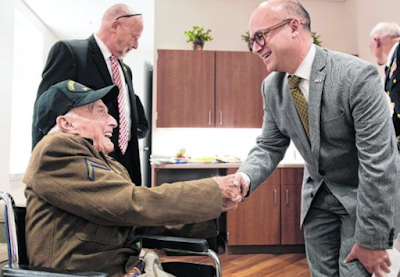 |
| Brother Harry Wolfe congratulated by Guillaume Lacroix, Counsel General of France for the Midwest |
 Brother Wolfe was severely wounded during combat along the Seille River on the Lorraine front on November 8, 1944, and he credits his Masonic ring for perhaps saving his life at the hands of German medics.
Brother Wolfe was severely wounded during combat along the Seille River on the Lorraine front on November 8, 1944, and he credits his Masonic ring for perhaps saving his life at the hands of German medics.The Order of Légion d'Honneur was created by Napoleon Bonaparte in 1802, and is given to reward military and civilian service to France.
Private Wolfe wasn't drafted, he enlisted in the U.S. Army on March 28, 1944, and became a rifleman for Company G, 318th Infantry Regiment, 80th Infantry Division, under the command of Gen. George S. Patton.
“Everybody who lived in our society in those days realized that it was time we had to go to war. Our civilization was in terrible shape. Someone had to come forth and get rid of Nazism,” he said. “Thank God, we were the ones who went.”
Wolfe went from Fort Benjamin Harrison in Indianapolis to Camp Blanding, one of the primary training centers for replacement troops during the war. He was schooled in skills such as orienteering, marksmanship and lobbing grenades. His unit completed miles-long marches, spending nights at a time out in the Florida wilderness before finally completing a 25-mile hike.
The 17 weeks at the camp transformed him into a soldier. “I was 130 pounds when I went in, and I gained a pound a week, so I was 147 pounds when I went to war,” he said.
Wolfe and his unit left the U.S. in September 1944 aboard the Ile d'France, a luxury liner that had been repurposed as a troop ship. They arrived in Scotland, took a train to southern England and then was transported across the English Channel to Normandy Beach.
Throughout late September and October, he made his way to the front lines in eastern France.
[SNIP]
On the day he was injured, Wolfe and his unit were slogging through mud and rain on a mission to cross the Seille River as the Army pushed towards Germany.
Machine gun fire and mortar rounds forced them to sprint across a flooded channel, sliding in the mud for cover. Moments later, Wolfe was struck with what he described as “like the kick of a mule.”
His fellow soldiers forced a pair of captured German medics to treat his wounds in hopes of saving his life. After the soldiers left, the Germans could have easily shot him, or left him to die. Instead, they cleaned and dressed the wound, put on a tourniquet and covered him in rain gear.
Wolfe was a member of the Masonic Lodge; he had been inducted as a Master Mason in the organization the night before he shipped off for war. His wife, Elsie, had given him a beautiful ring to mark the occasion and he was wearing the ring when he was shot.
With no other way to explain their compassion, Wolfe believes they may have recognized him as a Mason.
“These two medics stepped aside and started mumbling between the two of them. They must have seen my ring, because they gave me the best kind of treatment I could have,” he said. “I often wonder if that wasn’t a brother Mason.”Miraculously, the bullet that struck him had missed ligaments and the main artery, so his leg did not need to be amputated. Following surgery, Wolfe was returned stateside for his rehabilitation. After the war, he worked in the finance department at Fort Benjamin Harrison, then Job Corps, and eventually for the Internal Revenue Service. He lived much of his adult life in Vermont, Indiana and Arizona.
For his bravery during combat, Harry has also been awarded the Bronze Star Medal, the European African Middle Eastern Ribbon with one Bronze Star, and the Purple Heart.
Seven weeks ago, he moved to Franklin and into Compass Park. Bill Pierce, administrator of the skilled nursing and rehabilitation center there says that, even in such a short time, Brother Wolfe has had an impact on those around him.
“Harry, to me, is the embodiment of an American soldier,” he said. “He’s a representation of what can happen in times of war. He’s representative of the battle scars, and those who have paid the ultimate sacrifice."
The cities of both Franklin and Indianapolis declared November 6th, 2018 to be “Harry A. Wolfe Day.” Lacroix and local military leaders, Command Sgt. Maj. James Brown, director of the Indiana Department of Veterans Affairs, and Maj. Gen. R. Martin Umbarger (ret.), former head of the Indiana National Guard, all spoke about the impact Wolfe and his fellow soldiers made to the liberation of France in 1944. He was also presented with letters from Vice President Mike Pence and Indiana Governor Eric Holcomb honoring him.
He's been a Freemason for 72 years.
Read the rest of Brother Wolfe's story HERE.
A video report from WXIN 59 can be seen HERE.



Is Governor Holcomb a member a masonic lodge
ReplyDelete